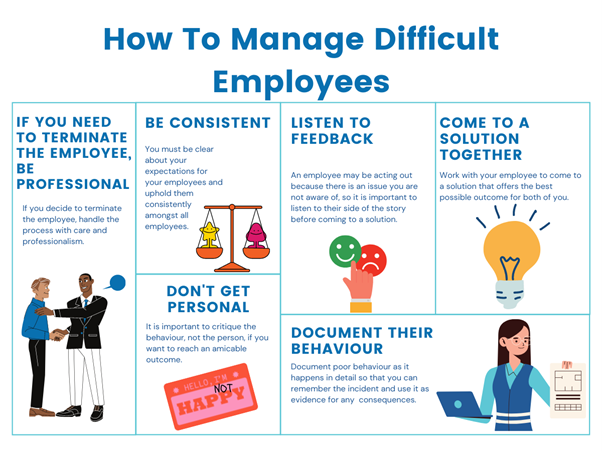How To Manage Difficult Employees
February 3, 2023
If you don’t already have a difficult employee on your payroll, chances are you will at some point over the course of your business journey. Just one difficult or disruptive employee can make the whole team less productive, so it is important that you solve the problem fast. Business Foundations has compiled a list of strategies you can implement to manage a difficult employee quickly and effectively if the time comes.
What are some examples of problematic behaviour from an employee?
- You are noticing that they are not being very productive and often fail to submit work on time or complete important tasks.
- They have a bad attitude and are critical of yourself or others.
- They frequently attempt to undermine you in front of others or ignore your instructions.
- They are frequently absent or late to work with no valid explanation.
1. Document their behaviour.
When you witness negative behaviour from your employees, it is important that you document it by writing the incident down in detail and record the date, time, and location of where it happened. It is useful to have a document trail of their behaviour if the issue escalates all the way to dismissal. Not only will it provide evidence of continuous poor behaviour, but you can also use this to defend yourself against potential accusations of wrongful termination. If you manage to solve the issue and the documentation isn’t needed – great! However, this documentation will be necessary in the event of an unresolvable issue.
2. Be consistent.
As a business owner, it is important that you are consistent and lead by example. You can’t approach an employee about their bad behaviour if you excuse this behaviour in others or haven’t had an issue with it before. It is not fair to your employees if you haven’t been clear about your expectations in the past. Instead, communicate your expectations to the team as a whole rather than singling out one employee.
3. Criticize the behaviour, not the person.
When you decide to address the difficult employee, it is important to focus on their behaviour, not them as a person. By being non-confrontational, they are more likely to listen to your feedback and correct their behaviour. The employee may not even be aware of how their behaviour has impacted the team, they may just feel unfulfilled, bored, confused, or they might have a personal issue. That is why it is important to remember that you are trying to reach a solution, not cause a confrontation.
4. Listen to feedback.
Oftentimes when an employee is being difficult, there is a reason behind their behaviour. It is important that you sit down with them and listen to their feedback so that you can see what is causing their negative behaviour. This may help you identify an issue you weren’t aware of and can now address, or perhaps even being listened to is enough to get them to improve their behaviour. Ultimately, knowing the full scope of the situation will equip you with the best chance of coming to a positive resolution.
5. Come to a solution together.
As a business owner, it is your job to support them and look for solutions to a problematic employee’s behaviour, rather than just tell them what they did wrong. Make it clear that you are hoping to come to a solution that you are both happy with and find out what the employee needs from you for them to improve. You will also need to be kind, but firm, in telling them that if they can’t improve their behaviour within a certain timeframe, there will be consequences.
6. If you need to terminate the employee, handle it professionally.
If you can’t resolve the problem and have exhausted every avenue, it may be in the best interest of your business to terminate the employee. By now, you should have collected your documentation so that you can do it by the book. If you know it is time to let them go, you can’t put it off or make someone else do it, you have to be brave and be professional. Keeping a disruptive employee to avoid the uncomfortable termination process will just delay the inevitable and hinder the team’s performance and morale.

Difficult and disruptive employees can impact the morale and productivity of your team, so it is important that your business resolves this behaviour quickly and effectively. By listening to the employee and working with them to find a solution, you will have the best chance of correcting problematic behaviour in your business.
Acknowledgement Of Country
Business Foundations acknowledges the traditional custodians throughout Western Australia and their continuing connection to the land, waters and community. We pay our respects to all members of the Aboriginal communities and their cultures; and to Elders both past and present.
Victoria
The Commons
80 Market Street,
South Melbourne VIC 3205
admin@businessfoundations.com.au
Western Australia
Wesley Central
2 Cantonment Street,
Fremantle WA 6160
admin@businessfoundations.com.au


Get In Touch
Have a question or to find out how we can help you, please get in touch.






